China is taking a giant leap in space medicine with plans to establish a groundbreaking 'space hospital' designed to safeguard astronaut health and advance humanity's capacity for long-term space exploration. The Shenzhen University of Advanced Technology and the Shanghai Engineering Center for Microsatellites announced a partnership this week to develop cutting-edge medical solutions for challenges ranging from orbital missions to future interstellar travel.
The initiative aims to integrate expertise in aerospace engineering, biotechnology, and medical innovation to create systems capable of real-time health monitoring, emergency care, and life support in space. Researchers will focus on validating advanced medical equipment, developing space-specific pharmaceuticals, and designing sustainable life-support systems for deep-space environments.
Beyond immediate astronaut needs, the project prepares for an era of commercial space travel and interplanetary migration. 'This isn't just about surviving in space—it's about enabling humanity to thrive beyond Earth,' a project representative told China Science Daily. The collaboration will also explore solutions for radiation protection, microgravity-induced health risks, and psychological challenges during extended missions.
Both institutions bring unique strengths to the table: Shenzhen University of Advanced Technology specializes in biomedical innovation, while the Shanghai Engineering Center contributes satellite technology and space systems experience. The project receives support from the Chinese Academy of Sciences, underscoring its strategic importance to China's space ambitions.
This development comes as multiple nations accelerate preparations for lunar bases and Mars missions. By addressing the medical hurdles of long-duration spaceflight, China positions itself at the forefront of what experts call 'the next frontier in human healthcare.'
Reference(s):
China to build future space hospital to support astronaut health
cgtn.com







